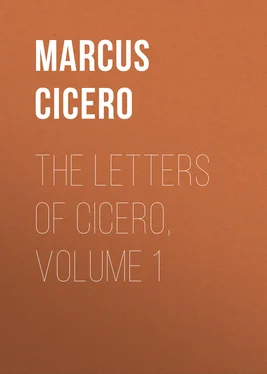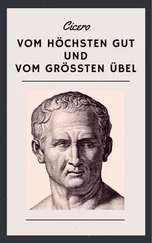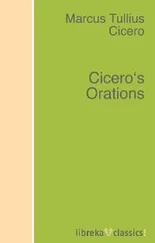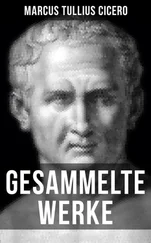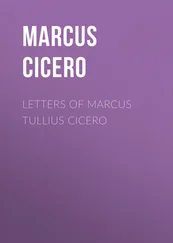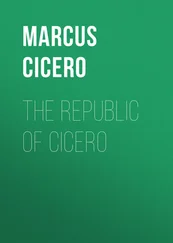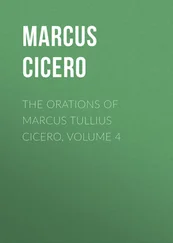Marcus Cicero - The Letters of Cicero, Volume 1
Здесь есть возможность читать онлайн «Marcus Cicero - The Letters of Cicero, Volume 1» — ознакомительный отрывок электронной книги совершенно бесплатно, а после прочтения отрывка купить полную версию. В некоторых случаях можно слушать аудио, скачать через торрент в формате fb2 и присутствует краткое содержание. Жанр: foreign_antique, Философия, foreign_edu, на английском языке. Описание произведения, (предисловие) а так же отзывы посетителей доступны на портале библиотеки ЛибКат.
- Название:The Letters of Cicero, Volume 1
- Автор:
- Жанр:
- Год:неизвестен
- ISBN:нет данных
- Рейтинг книги:4 / 5. Голосов: 1
-
Избранное:Добавить в избранное
- Отзывы:
-
Ваша оценка:
- 80
- 1
- 2
- 3
- 4
- 5
The Letters of Cicero, Volume 1: краткое содержание, описание и аннотация
Предлагаем к чтению аннотацию, описание, краткое содержание или предисловие (зависит от того, что написал сам автор книги «The Letters of Cicero, Volume 1»). Если вы не нашли необходимую информацию о книге — напишите в комментариях, мы постараемся отыскать её.
The Letters of Cicero, Volume 1 — читать онлайн ознакомительный отрывок
Ниже представлен текст книги, разбитый по страницам. Система сохранения места последней прочитанной страницы, позволяет с удобством читать онлайн бесплатно книгу «The Letters of Cicero, Volume 1», без необходимости каждый раз заново искать на чём Вы остановились. Поставьте закладку, и сможете в любой момент перейти на страницу, на которой закончили чтение.
Интервал:
Закладка:
Execution of the conspirators, December, b.c. 63. Its legal grounds and consequences.
The decree of the senate, videant consules, etc. , had come to be considered as reviving the full imperium of the consul, and investing him with the power of life and death over all citizens. Cicero acted on this (questionable) constitutional doctrine. He endeavoured, indeed, to shelter himself under the authority of a senatorial vote. But the senate never had the power to try or condemn a citizen. It could only record its advice to the consul. The whole legal responsibility for the condemnation and death of the conspirators, arrested in consequence of these letters, rested on the consul. To our moral judgment as to Cicero's conduct it is of primary importance to determine whether or not these men were guilty: to his legal and constitutional position it matters not at all. Nor was that point ever raised against him. The whole question turns on whether the doctrine was true that the senatus consultum ultimum gave the consul the right of inflicting death upon citizens without trial, i.e. , without appeal to the people, on the analogy of the dictator seditionis sedandæ causa , thus practically defeating that most ancient and cherished safeguard of Roman liberty, the ius provocationis . The precedents were few, and scarcely such as would appeal to popular approval. The murder of Tiberius Gracchus had been ex post facto approved by the senate in b.c. 133-2. In the case of Gaius Gracchus, in b.c. 121, the senate had voted uti consul Opimius rempublicam defenderet , and in virtue of that the consul had authorized the killing of Gaius and his friends: thus for the first time exercising imperium sine provocatione . Opimius had been impeached after his year of office, but acquitted, which the senate might claim as a confirmation of the right, in spite of the lex of Gaius Gracchus, which confirmed the right of provocatio in all cases. In b.c. 100 the tribune Saturninus and the prætor Glaucia were arrested in consequence of a similar decree, which this time joined the other magistrates to the consuls as authorized to protect the Republic: their death, however, was an act of violence on the part of a mob. Its legality had been impugned by Cæsar's condemnation of Rabirius, as duovir capitalis , but to a certain extent confirmed by the failure to secure his conviction on the trial of his appeal to the people. In b.c. 88 and 83 this decree of the senate was again passed, in the first case in favour of Sulla against the tribune Sulpicius, who was in consequence put to death; and in the second case in favour of the consuls (partisans of Marius) against the followers of Sulla. Again in b.c. 77 the decree was passed in consequence of the insurrection of the proconsul Lepidus, who, however, escaped to Sardinia and died there.
In every case but one this decree had been passed against the popular party. The only legal sanction given to the exercise of the imperium sine provocatione was the acquittal of the consul Opimius in b.c. 120. But the jury which tried that case probably consisted entirely of senators, who would not stultify their own proceedings by condemning him. To rely upon such precedents required either great boldness (never a characteristic of Cicero), or the most profound conviction of the essential righteousness of the measure, and the clearest assurance that the safety of the state—the supreme law—justified the breach of every constitutional principle. Cicero was not left long in doubt as to whether there would be any to question his proceeding. On the last day of the year, when about to address the people, as was customary, on laying down his consulship, the tribune Q. Cæcilius Metellus Nepos forbade him to speak, on the express ground that he "had put citizens to death uncondemned"— quod cives indemnatos necavisset . Cicero consoled himself with taking the required oath as to having observed the laws, with an additional declaration that he had "saved the state." Nevertheless, he must have felt deeply annoyed and alarmed at the action of Metellus, for he had been a legatus of Pompey, and was supposed to represent his views, and it was upon the approbation and support of Pompey, now on the eve of his return from the East, that Cicero particularly reckoned.
Letters after b.c. 63.
The letters in our collection now recommence. The first of the year (b.c. 62) is one addressed to Pompey, expressing some discontent at the qualified manner in which he had written on recent events, and affirming his own conviction that he had acted in the best interests of the state and with universal approval. But indeed the whole correspondence to the end of Cicero's exile is permeated with this subject directly or indirectly. His quarrel with Metellus Nepos brought upon him a remonstrance from the latter's brother (or cousin), Metellus Celer (Letters XIII, XIV), and when the correspondence for b.c. 61 opens, we find him already on the eve of the quarrel with Publius Clodius which was to bring upon him the exile of b.c. 58.
Publius Clodius Pulcher.
P. Clodius Pulcher was an extreme instance of a character not uncommon among the nobility in the last age of the Republic. Of high birth, and possessed of no small amount of ability and energy, he belonged by origin and connexion to the Optimates; but he regarded politics as a game to be played for his personal aggrandizement, and public office as a means of replenishing a purse drained by boundless extravagance and self-indulgence. His record had been bad. He had accompanied his brother-in-law Lucullus, or had joined his staff, in the war with Mithridates, and had helped to excite a mutiny in his army in revenge for some fancied slight. He had then gone to Cilicia, where another brother-in-law, Q. Marcus Rex, was proprætor, and while commanding a fleet under him had fallen into the hands of pirates, and when freed from them had gone—apparently in a private capacity—to Antioch, where he again excited a mutiny of Syrian troops engaged in a war against the Arabians (b.c. 70-65). On his return to Rome he attempted to make himself conspicuous by prosecuting Catiline, but accepted a bribe to withdraw. In b.c. 64, on the staff of the governor of Gallia Narbonensis, he is accused of having enriched himself with plunder. For a time after that he was still acting as a member of the party of the Optimates; seems to have supported Cicero during the Catiline conspiracy; and in b.c. 62 stood for the quæstorship and was elected. His violation of the mysteries was alleged to have been committed in December of that year, and before he could go to the province allotted to him as quæstor in Sicily he had to stand a trial for sacrilege. Such an offence—penetrating in disguise into the house of the Pontifex Maximus, when his wife was engaged in the secret rites of the Bona Dea—would place him under a curse, and not only prevent his entering upon his quæstorship, but would disfranchise and politically ruin him. Clodius would seem not to have been a person of sufficient character or importance to make this trial a political event. But not only had he powerful backers, but his opponents also, by proposing an innovation in the manner of selecting the jurors for trying him, had managed to give a spurious political importance to the case. One of the most brilliant of the early letters ( XV XV (f v, 6) TO P. SESTIUS 65 (IN MACEDONIA) Rome, December b.c. 62, æt. 44 Decius the copyist has been to see me, and begged me to try and secure that no successor should be appointed to you this turn. Though I regarded him as a man of good character and attached to you, yet, remembering the tenor of your previous letter to me, I could not feel certain that the wishes of a cautious man of the world like yourself had undergone so complete a change. But after your wife Cornelia had called on Terentia, and I had had a conversation with Q. Cornelius, I took care to be present at every meeting of the senate, and found that the greatest trouble was to make Fufius the tribune, and the others to whom you had written, believe me rather than your own letters. The whole business has, after all, been postponed till January, but there is no difficulty about it. Roused by your congratulations—for in a letter sometime ago you wished me good luck on the completion of my purchase of a house from Crassus—I have bought that very house for 3,500 sestertia (about £28,000), a good while subsequent to your congratulation. Accordingly, you may now look upon me as being so deeply in debt as to be eager to join a conspiracy if anyone would admit me! But, partly from personal dislike they shut their doors in my face and openly denounce me as the punisher of conspiracy, partly are incredulous and afraid that I am setting a trap for them! Nor do they suppose that a man can be short of money who has relieved the money-lenders from a state of siege. In point of fact, money is plentiful at six per cent., and the success of my measures has caused me to be regarded as a good security. Your own house, and all the details of its construction, I have examined and strongly approve. As for Antonius, 66 though everyone notices his want of attention to my interests, I have nevertheless defended him in the senate with the utmost earnestness and persistence, and have made a strong impression on the senate by my language as well as by my personal prestige. Pray write to me more frequently.
, p. 37) gives us a graphic picture of the trial. Clodius was acquitted and went to his province, but returned in b.c. 60, apparently prepared for a change of parties. Cicero and he had quarrelled over the trial. He had said sarcastic things about the sacred consulship, and Cicero had retaliated by bitter speeches in the senate, and by giving evidence at the trial of having seen Clodius in Rome three hours before he professed to have been at Interamna, on the day of the alleged sacrilege. It is perhaps possible that his alibi may have been true in substance, for he may have been well out of Rome on his way to Interamna after seeing Cicero. But, however that may be, he nourished a grudge against Cicero, which he presently had an opportunity of satisfying. The year of his return to Rome from Sicily (b.c. 60) was the same as that of Cæsar's return from Spain. Pompey—who had returned the year[Pg xxviii] before—was at enmity with the senate on account of the difficulties raised to the confirmation of his acta and the allotments for his veterans. Cæsar had a grievance because of the difficulties put in the way of his triumph. The two coalesced, taking in the millionaire Crassus, to form a triumvirate or coalition of three, with a view to getting measures they desired passed, and offices for themselves or their partisans. This was a great blow to Cicero, who clung feverously to Pompey as a political leader, but could not follow him in a coalition with Cæsar: for he knew that the object of it was a series of measures of which he heartily disapproved. His hope of seeing Pompey coming to act as acknowledged leader of the Optimates was dashed to the ground. He could not make up his mind wholly to abandon him, or, on the other hand, to cut himself adrift from the party of Optimates, to whose policy he had so deeply committed himself. Clodius was troubled by no such scruples. Perhaps Cæsar had given him substantial reasons for his change of policy. At any rate, from this time forward he acts as an extreme popularis —much too extreme, as it turned out, for Pompey's taste. As a patrician his next step in the official ladder would naturally have been the ædileship. But that peaceful office did not suit his present purpose. The tribuneship would give him the right to bring forward measures in the comitia tributa , such as he desired to pass, and would in particular give him the opportunity of attacking Cicero. The difficulty was that to become tribune he must cease to be a patrician. He could only do that by being adopted into a plebeian gens. He had a plebeian ready to do it in b.c. 59. But for a man who was sui iuris to be adopted required a formal meeting of the old comitia curiata , and such a meeting required the presence of an augur, as well as some kind of sanction of the pontifices. Cæsar was Pontifex Maximus, and Pompey was a member of the college of augurs. Their influence would be sufficient to secure or prevent this being done. Their consent was, it appears, for a time withheld. But Cæsar was going to Gaul at the end of his consulship, and desired to have as few powerful enemies at Rome during his absence as possible. Still he had a personal feeling for Cicero, and when it was known that one of Clodius's objects in seeking to become a plebeian and a tribune was to attack him, Cæsar offered him two chances of honourable retreat—first as one of the commissioners to administer his land law, and again as one of his legati in Gaul. But Cicero would not accept the first, because he was vehemently opposed to the law itself: nor the second, because he had no taste for provincial business, even supposing the proconsul to be to his liking; and because he could not believe that P. Clodius would venture to attack him, or would succeed if he did. Cæsar's consulship of b.c. 59 roused his worst fears for the Republic; and, though he thought little of the statesmanship or good sense of Cæsar's hostile colleague Bibulus, he was thoroughly disgusted with the policy of the triumvirs, with the contemptuous treatment of the senate, with the high-handed disregard of the auspices—by means of which Bibulus tried to invalidate the laws and other acta of Cæsar—and with the armed forces which Pompey brought into the campus , nominally to keep order, but really to overawe the comitia , and secure the passing of Cæsar's laws. Nor was it in his nature to conceal his feelings. Speaking early in the year in defence of his former colleague, C. Antonius, accused of maiestas for his conduct in Macedonia, he expressed in no doubtful terms his view of the political situation. Within a few hours the words were reported to the triumvirs, and all formalities were promptly gone through for the adoption of Clodius. Cæsar himself presided at the comitia curiata , Pompey attended as augur, and the thing was done in a few minutes. Even then Cicero does not appear to have been alarmed, or to have been fully aware of what the object of Publius was. While on his usual spring visit to his seaside villas in April (b.c. 59), he expressed surprise at hearing from the young Curio that Clodius was a candidate for the tribuneship (vol. i., p. 99). His surprise no doubt was more or less assumed: he must have understood that Clodius's object in the adoption was the tribunate, and must have had many uneasy reflexions as to the use which he would make of the office when he got it. Indeed there was not very much doubt about it, for Publius openly avowed his intentions. We have accordingly numerous references, in the letters to Atticus, to Cicero's doubts about the course he ought to adopt. Should he accept Cæsar's offer of a legation in Gaul, or a free and votive legation? Should he stay in Rome and fight it out? The latter course was the one on which he was still resolved in July, when Clodius had been, or was on the point of being, elected tribune (p. 110). He afterwards wavered (p. 113), but was encouraged by the belief that all the "orders" were favourable to him, and were becoming alienated from the triumvirs (pp. 117, 119), especially after the affair of Vettius (pp. 122-124), and by the friendly disposition of many of the colleagues of Clodius in the tribuneship. With such feelings of confidence and courage the letters of b.c. 59 come to an end.
Интервал:
Закладка:
Похожие книги на «The Letters of Cicero, Volume 1»
Представляем Вашему вниманию похожие книги на «The Letters of Cicero, Volume 1» списком для выбора. Мы отобрали схожую по названию и смыслу литературу в надежде предоставить читателям больше вариантов отыскать новые, интересные, ещё непрочитанные произведения.
Обсуждение, отзывы о книге «The Letters of Cicero, Volume 1» и просто собственные мнения читателей. Оставьте ваши комментарии, напишите, что Вы думаете о произведении, его смысле или главных героях. Укажите что конкретно понравилось, а что нет, и почему Вы так считаете.
